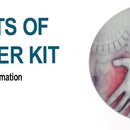IBS Healer Kit
Regular price
$107.87
Sale
IBS is a functional disorder of the small intestine, characterized by pain, discomfort and altered bowel habits. Irritable bowel syndrome is a relatively common digestive system disorder whose exact cause is still unknown in Western medicine.
In Ayurveda, IBS is called grahani, which means retaining the ability of the small intestine or duodenum. If these organs' functions are altered or the bowel loses control and its absorption is weakened, the condition is considered grahani.
Common Causes of IBS
Ayurveda considers poor digestive fire (mandagni) and the production of toxins (ama) as the main cause of IBS. From an Ayurvedic perspective, IBS is linked to:
- Excessive fasting or excessive food intake.
- Eating before the previous meal has been fully digested.
- Eating improper or unwholesome food.
- Continuous diarrhoea or food poisoning.
- Consumption of heavy, cold, dry, junk and polluted food.
- Suppression of natural urges.
- Irregular sleep habits (e.g. staying awake at night and sleeping during the day).
- Grief, anger or fear.
- Chronic illness leads to weak digestion
- Weakened immune system.
- Constant travel and change of places.
Symptoms of IBS
- Nausea
- Abdominal pain and bloating
- Anorexia
- Weight loss
- Headache and tiredness
- Chronic constipation and/or diarrhoea
- Mucus and/or blood in stools
-
Anxiety or depression
Complications of IBS
- Untreated IBS may lead to complications such as:
- Skin disease
- Anaemia (low iron levels)
- Oedema (fluid retention)
- Anorectal disease (like haemorrhoids, fissure or fistula in anus)
- Abdominal pain
- Abdominal tumour
Ayurvedic Management of IBS
- Ayurvedic treatment of Irritable Bowel Syndrome involves alleviating aggravated body energies, restoring the function of the digestive system, and eliminating accumulated toxins. As stress is often a significant cause of the disorder, an important line of treatment consists of lifestyle guidance and herbs to nourish the mind and nervous system.
Lifestyle Management
- Identify and remove food intolerances.
- Avoid an unwholesome diet including curd, alcohol, fermented beverages, junk food and gas-producing food such as eggplant, cabbage, broccoli, cauliflower, etc.
- Restore the healthy balance of good bacteria and flora in the gut (ayurvedic butter milk is wonderful for this).
- Attain a balanced mind by practising modalities that help you manage stress, for example, yoga, meditation, tai chi, etc.
- Sleep well. Get adequate quantity and quality of sleep.
- Line of treatment in IBS
- Ayurvedic treatment is conducted according to your body constitution. It is necessary to consult an experienced Ayurvedic physician who can diagnose your mind/body type and customise a program for your particular health needs.
- Ayurvedic detox (panchakarma)
- Ayurveda believes it is best to treat the root cause rather than the disease symptoms. A full ayurvedic detox (panchakarma) is necessary for ridding toxins from the body and re-establishing colon health. Panchakarma treatment for IBS emphasises medicated enema (vasti), which is a colon cleansing therapy. Ayurvedic enemas provide herbal cleansing and nourishment directly into the intestine and colon, without having to pass through the stomach and upper gastrointestinal tract. With a therapeutic ayurvedic enema, a cleansing and healing message is sent directly to the colon
- Panchakarma for IBS will also include:
- Abhyanga (ayurvedic therapeutic massage)
- Shirodhara (warm oil treatment on forehead)
- Chakra Basti (warm oil treatment around the naval and associated marma points)
- Ayurveda herbal treatment
- Medicines for IBS should have the following qualities:
- Deepana – carminative property, to improve your digestive fire and reduce flatulence.
- Pachana – to promote digestion
- Sangrahi – intestinal restorative, which increases the absorption capacity of the intestines
Benefits

































































































